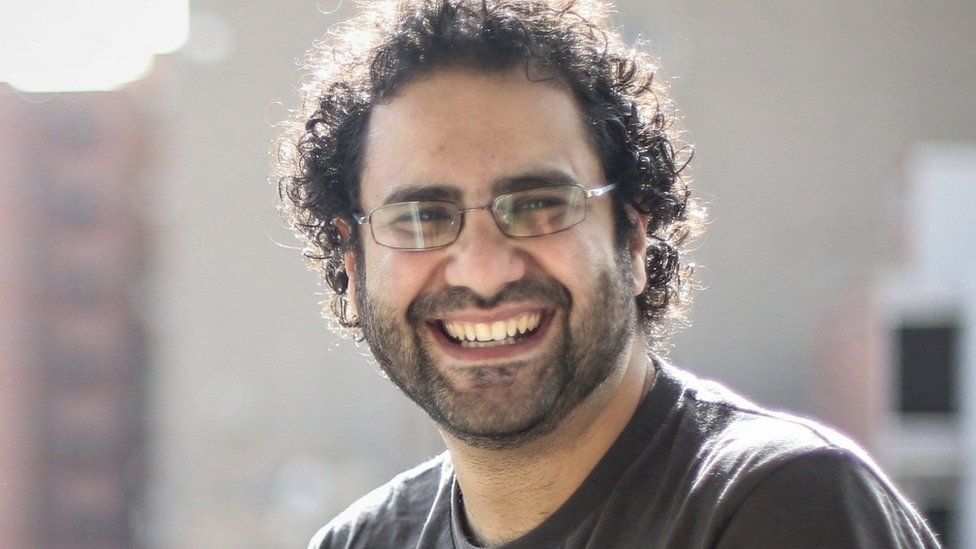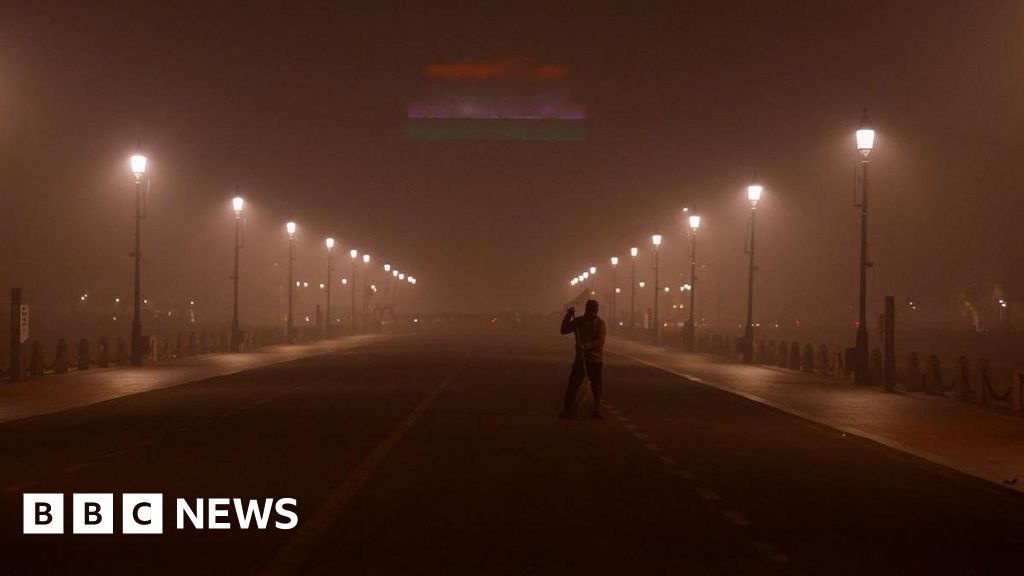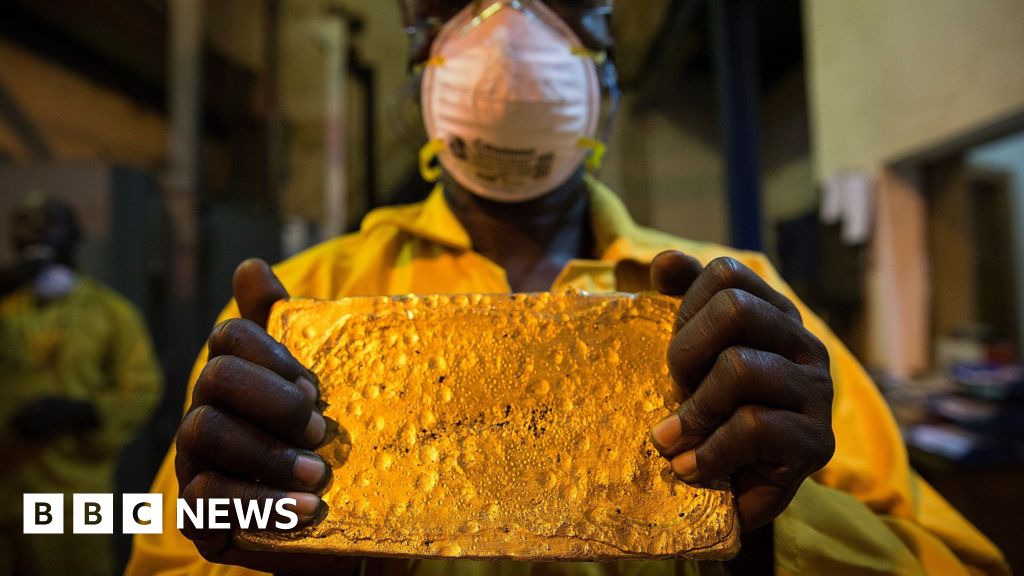ARTICLE AD BOX
 Image source, OMAR ROBERT HAMILTON
Image source, OMAR ROBERT HAMILTON
The UN human rights chief said Alaa Abdel Fattah's life was "at acute risk"
The family of jailed British-Egyptian pro-democracy activist Alaa Abdel Fattah have demanded authorities in Cairo provide proof he is still alive.
They have not heard from him since he escalated his seven-month hunger strike on Sunday by refusing water.
His sister told the BBC that it felt as if they were "dealing with a complete black hole", with the UK government also unable to provide any information.
UK Prime Minister Rishi Sunak said his case grew "more urgent by the day".
He told the House of Commons on Wednesday that he had spoken to Egyptian President Abdul Fattah al-Sisi at the COP27 climate summit in Sharm el-Sheikh and would continue to press the Egyptian government to "resolve the situation".
"We want to see Alaa freed and reunited with his family as soon as possible," he added.
However, when pressed by Labour leader Keir Starmer on whether any progress had been made in securing Abdel Fattah's release, Mr Sunak did not provide an answer.
On Tuesday, UN human rights chief Volker Türk and German Chancellor Olaf Scholz also urged Egypt to release Abdel Fattah immediately.
"Abdel Fattah is in great danger. His dry hunger strike puts his life at acute risk," Mr Türk warned, describing him as one of a number of people in Egypt who had been "arbitrarily deprived of their liberty and incarcerated after unfair trials on multiple occasions".
Watch: Egyptian MP confronts sister of jailed activist Alaa Abdel Fattah and gets kicked out of press conference
Egyptian Foreign Minister Sameh Shoukry told CNN: "This is a judicial matter and my understanding is that he has been convicted and is currently fulfilling his jail term. Any recourse to judicial process is still available."
Asked about the risk of Abdel Fattah dying, he said: "I believe that within the penal code, there is constant review of medical conditions for all inmates and that the necessary healthcare is provided. So I think there might be a misconception as relates to his actual status."
French President Emmanuel Macron said on Monday that he had been assured by Mr Sisi that Egypt was "committed to ensuring that [the] health of Alaa Abdel Fattah is preserved".
But Abdel Fattah's family expressed concern that such comments might mean prison authorities were force-feeding him or putting him on intravenous drips against his will.
Abdel Fattah, a 40-year-old father of one, first rose to prominence during the 2011 uprising that forced long-time President Hosni Mubarak to resign.
Since Mr Sisi came to power in 2014 after leading the military's overthrow of Mubarak's democratically elected successor, he has spent most of the time in prison or police detention.
Last year, he was convicted of "spreading false news" in a Facebook post - a charge human rights groups condemned as spurious - and sentenced to five years in prison.
He began a partial hunger strike in April, hoping to pressure Egypt into at least allowing British diplomats to visit him.
With authorities continuing to refuse consular access, Abdel Fattah told his family in a letter from Wadi al-Natroun prison on 31 October that he would drink only water until the start of COP27 of Sunday and would then stop even doing that.
"The Egyptian authorities are not providing any information. UK officials in Egypt are unable - to our knowledge - to obtain any concrete information about Alaa's wellbeing and how he is doing," his sister, Mona Seif, told the BBC's Breakfast programme from London on Wednesday morning.
"My mother is, right now, heading to the prison for the third day in a row, waiting for a letter or anything to prove that he is alive and even that he is still there. We have no idea if he has been transferred to another location and that we haven't been told."
(July 2022) Alaa Abdel Fattah: 'He’s certain he’ll never come out of prison alive'
Ms Seif said prison officials were claiming that Abdel Fattah had refused to write a letter.
"We have no way of verifying [that]. So we don't know if he is being prevented from writing the letter or he has deteriorated beyond the point where he can't even be cognitively present to write us a letter. Or if he is actually refusing to write the letter and something has triggered that response from him."
She explained that her brother "cannot endure any more time in jail" and that he had decided to escalate his hunger strike during COP27 because the world was focusing on Egypt.
"We and he truly believe that if he doesn't get out of prison while COP27 is happening, Alaa is never going to make it out of prison.
"The Egyptian regime... intends for him to stay in prison until he dies. And this is a punishment completely for him being outspoken about their crimes and human rights violations."
Ms Seif also lamented that the British government had so far not shared with the family any plan or timeline for Abdel Fattah's release.
"What they can do is bring Alaa home on a plane. This is not unheard of. It has been done for dual nationals with US citizenship, Canadian citizenship, with French citizenship. So I'm not sure why the UK government is failing to do so when Alaa is in a critical condition."
David Lammy, the shadow foreign secretary and the Labour constituency MP for Mona Seif and her sister Sanaa, told the BBC's Today programme that the Foreign Office should have acted sooner and used leverage that the UK had over Egypt.
"We have a £4bn trading partnership with Egypt. That is tremendous influence. Why has it taken months and months and months for the Foreign Office to act? The prime minister has effectively been dragged into this case because of COP. That should not have been the case."
"I've got to tell you that UK citizens have been badly, badly let down."

 2 years ago
19
2 years ago
19








 English (US)
English (US)